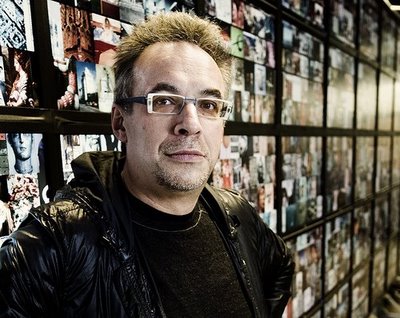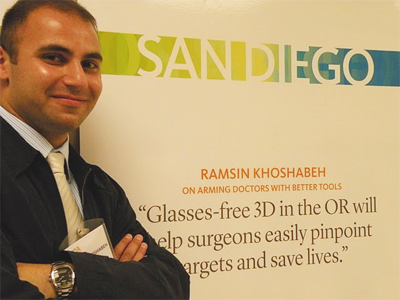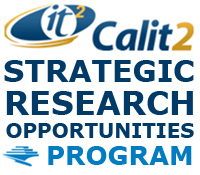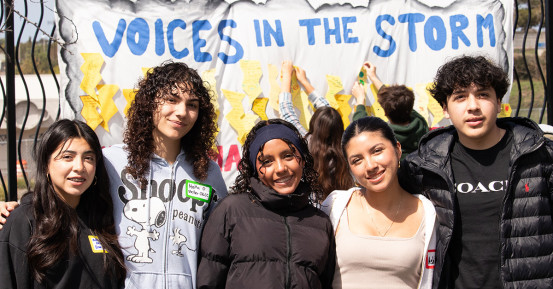Calit2 Launches Second Round of Strategic Research Grants for UCSD Faculty
By:
- Doug Ramsey
Published Date
By:
- Doug Ramsey
Share This:
Article Content

Visual arts professor Lev Manovich, who leads the Software Studies Initiative at Calit2, received a grant in the inaugural 2010 round of CSRO awards to support a project on 'supervisualization of large image collections'.
The California Institute for Telecommunications and Information Technology (Calit2) has announced the second round of its Calit2 Strategic Research Opportunities (CSRO) grant program. Faculty and research scientists at the University of California, San Diego are eligible to submit proposals for funding and in-kind support, with all proposals due no later than July 27, 2012. Winning proposals will be announced in August for one-year projects that will begin effective October 1, 2012.
Researchers are invited to propose projects that fall under one or more areas spelled out in Calit2’s strategic vision, adopted in 2010. These include four application thrusts (culture, energy, environment and health) and four enabling technologies (wireless, photonics, cyberinfrastructure and nano-microelectromechanical systems). Calit2 says it will be particularly receptive to proposals in the health and culture arenas, and ones which address both an application thrust and an enabling technology.
“Wireless health is a good example of a sector where technology development promises to yield important benefits for society at large,” said Ramesh Rao, director of the UC San Diego division of Calit2. “We are looking for the faculty to propose high-impact, near-term projects that also achieve high marks in the technical review process.”
The 3-to-5-page proposals must be submitted electronically through the online CSRO Proposal Upload manager. Most winning proposals will be awarded a combination of cash and in-kind support, e.g., including access to Calit2 technical personnel, equipment, lab space, and services. Faculty interested in submitting a proposal are urged to read the Call for Proposals, background information on Calit2 research, its Strategic Vision, and other aspects of the CSRO program, including frequently asked questions.
Total funding for the new round is expected to exceed the $700,000 in support awarded to a total of 19 winning projects in the inaugural May 2010 round of CSRO grants. The majority of awards will be in the $20,000 to $60,000 range.

Electrical engineering Ph.D. student Ramsin Khoshabeh was awarded a one-year CSRO Fellowship in 2010 to work on the '3D-Enabled Surgical System,' with co-PIs Truong Nguyen from ECE and professor of surgery Mark Talamini.
Funds for the CSRO program do not come from California taxpayers. The cash portion of these awards, including CSRO Fellowships for graduate student researchers, is funded through gifts and donations to Calit2 from corporations, notably Qualcomm, Inc., private foundations and other business or philanthropic institutions.
In addition to donated funds, some funding for specific projects awarded in 2012 may come from affiliated research centers at UC San Diego. This funding would be awarded at the research center’s discretion, based on the scope and relevance of a project approved by the CSRO Program Committee (allowing Calit2 to use its funds on other worthy projects). These centers and areas of interest include:
- Center for Wireless Communications (CWC), which has broad interests to support research in robust wireless communication, multimedia communication and systems, devices for next-generation communication, wireless health, and more;
- Information Theory and Applications Center (ITA), which has expressed interest in areas including communication and social networks, inference in noisy and large data, and coding for cloud computing and storage;
- Center for Integrated Access Networks (CIAN), which is interested in projects that relate to optics and photonics in data centers, multicore computing/processing, and sensing;
- Moxie Center, the Jacobs School of Engineering’s newly-established incubator, which aims to promote entrepreneurial projects and experiences for engineering undergraduates; and the
- international innovation initiative (i3), a soon-to-be-announced program of visiting international fellows from foreign industry, research laboratories, and government institutions housed at Calit2. Its inaugural year is funded by the Ministry of Knowledge Economy (MKE), Korea Evaluation Institute of Industry Technology (KEIT), Korea Electronics Technology Institute (KETI), and i3 will be focused on 4 strategically identified labs spanning wireless HD, computer vision and robotics, renewable energy, power semiconductors, and automotive market analysis and policy.
“We appreciate the rigorous process that Calit2 uses to select the best of the proposals submitted by UC San Diego faculty,” said Rajesh Gupta, chair of the Computer Science and Engineering department. “Our new Moxie Center’s mission is to promote innovation and entrepreneurship by motivating, educating and mentoring undergraduate engineering students via an incubator program. We see the CSROs as a further opportunity to invest in undergraduate research on projects that could be domiciled in the Moxie Center workspaces in the CSE or Mechanical and Aerospace Engineering buildings.”

CSRO proposals are due July 27, 2012, for projects that will begin effective October 1, 2012.
The program will be open to all 335 UCSD faculty members who are academic participants in Calit2, as well as other senior UCSD researchers who are eligible to serve as independent principal investigators on extramural awards. Faculty who want to affiliate with Calit2 and submit a CSRO proposal can do so by signing and submitting an online Investigator Agreement.
“We are reaching out to the broad community of researchers, many of whom may not have been on campus in the formative years of the institute,” said CSRO program chair Curt Schurgers, a Calit2 functional manager and former professor in the Electrical and Computer Engineering department of the Jacobs School. “Nearly half of the faculty recipients of CSRO awards in 2010 were newcomers to Calit2. The CSRO program has become an important way to engage with faculty who share our vision and research agenda.”
In its 2010 Strategic Vision, the institute targeted four major application thrusts: energy, the environment, health and culture. The plan also calls for continued investment in enabling technologies. While the current Call for Proposals emphasizes health, culture and enabling technologies, investigators are also welcome to submit proposals centered on energy or the environment, particularly if they are related to work in wireless, cyberinfrastructure or other enabling technologies.
Calit2 has invested heavily in personnel, equipment and services, and the CSRO program allows the institute to allocate a portion of those resources to new projects that are liable to produce proofs of concept, early prototypes, research findings and early-stage successes that may position a CSRO grantee to go after much larger federal grants in future.
All proposals will be judged on five criteria: scientific and technical merits; relevance to Calit2’s strategic thrusts and enabling technologies; cost realism against the proposed effort; use of existing Calit2 infrastructure or the project’s potential to contribute to that infrastructure; and the likelihood of achieving pre-identified measures of success.
Proposed projects under the program are not required to be multidisciplinary, but projects spanning different technical areas, departments, divisions or schools at UC San Diego will receive preference.
Share This:
You May Also Like
Stay in the Know
Keep up with all the latest from UC San Diego. Subscribe to the newsletter today.



